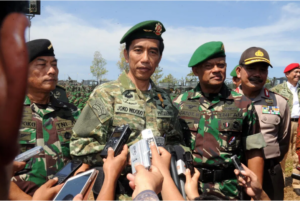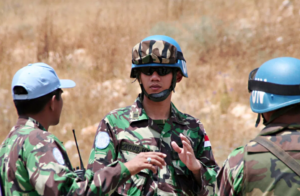JAKARTA – It is now two decades since the Indonesian military lost its grip on the levers of power but some senior generals still see their service background, rooted in a culture of privilege and patronage, as an enduring passport to the country’s highest office.
In his final year as armed forces (TNI) commander, presidential chief of staff General Moeldoko, now 63, often expressed such ambitions. As one military analyst notes: “Anyone who has been TNI chief thinks it is their manifest destiny to be president.â€
But in a new democratic era and without the necessary charisma or the money as an added attraction, the East Java-born general has never been able to find a political party to serve as an electoral launch pad.
Now, he is fighting off accusations that he tried to engineer a coup within former president Susilo Bambang Yudhoyono’s Democrat Party, which is led by Yudhoyono’s eldest son, Agus Harimurti Yudhoyono, 42.
Agus ended a promising army career to follow his father into politics in 2016 but efforts by the former First Family to create a dynasty haven’t gone down well with older Democrat stalwarts, whose links to the party go back to its inception in 2001.
The malcontents see the younger Yudhoyono as a novice who is not qualified to run a party, noting as well that a retired major doesn’t have the rank and therefore the gravitas to meet on equal terms with his seniors in the armed forces, retired or otherwise.
But one senior Yudhoyono loyalist told Asia Times that Agus was part of a broader generational change in the ranks of Democrat cadre, which has made the seventh-ranked party more attractive to younger voters and helped elevate it to as high as third in recent polls.

Where the revolt goes from here remains unclear. “It seems the general is not going through with the plan but we understand there are still some people trying to take advantage of the situation and are approaching others to join them,†he said. “We’re trying to figure out what is true and what isn’t.â€
However unusual, analysts say the episode signals the start of the political maneuvering that is to be expected as Indonesia heads towards the next presidential election in 2024 when President Joko Widodo ends his second and final term in office.
Defense Minister Prabowo Subianto, the leader of the Great Indonesia Movement Party (Gerindra) and Widodo’s rival in the 2019 race, is still the leading prospect but he may face stiff challenges from several provincial governors.
Chief among them at this early stage is popular Central Java Governor Ganjar Pranowo, 52, a member of Widodo’s Indonesian Democratic Party for Struggle (PDI-P), who topped a recent New Indonesia Research & Consulting poll of presidential hopefuls.
Prabowo, 69, was in second place, perhaps because he has chosen to adopt a low profile during his time in the Widodo government, a calculated strategy to ensure Widodo’s support when the presidential campaign finally gets underway.
One of the last of the political holdouts from Suharto’s New Order era, he may well be the last retired Indonesian general to make a serious run for the presidency, at least for the foreseeable future.
Unlike Myanmar and Thailand, where recalcitrant military regimes are under unprecedented pressure from a younger generation to relinquish their hold on power, the Indonesian military, stays largely in the background.

Indeed, it is difficult to see the military making a political comeback given the strength of the country’s civil society and the way Indonesians in general have embraced the idea of voting for their leaders.
Democrat Party insiders say while Widodo may have known about Moeldoko’s underhand move, they dismiss suggestions it was a plot hatched in the palace. Rather, they say, the chief of staff appears to have been acting on his own.
Agus Yudhoyono claims that a disaffected old guard of former and serving members was part of a plot to persuade a majority on the party’s executive board to call an extraordinary congress with the aim of ousting him from the leadership.
“With Moeldoko’s involvement, this movement is a form of intervention from external parties which are endangering the sovereignty and reputation of the Democrat (Party),†he said in a written February 5 interview with Tempo magazine.
Moeldoko has acknowledged meeting with a group of nine South Kalimantan party leaders at a Jakarta hotel on January 27 but he declined to go into the substance of the discussion and said he had never spoken about using the party to run for the presidency.
Widodo has not responded to a letter Agus sent to him asking for clarification of claims made during an internal party investigation that he (the president) had allegedly given his blessing to the change in the Democrat leadership.
Media reports have identified former secretary-general Marzuki Alie, 65, ex-treasurer Muhammad Nazaruddin, 42, former supervisory committee member Darmizal and three-term North Sumatra legislator Jhoni Allen Marbun, 60, among the malcontents.
Alie, who served a five-year term as Parliament speaker and then dropped out of sight after losing his Jakarta seat in the 2014 legislative elections, has denied any involvement in the attempted coup.

He has, however, had long-standing links to Moeldoko. One party source recalls an occasion in 2015 when the serving general recommended to a visibly upset Yudhoyono that he appoint Alie as the party secretary-general.
Nazaruddin was at the hotel meeting, one of the few occasions he has surfaced in public since being released from jail last June after serving eight years for bribery and money laundering. His role in the drama is still not clear.
Darmizal, who quit the Democrats in 2018 to join volunteers working to re-elect Widodo, took Yudhoyono loyalists aback when he appeared at a recent press conference to openly support Moeldoko as the new party head.
The former president, who remains head of the Democrat advisory board, took part in a crisis meeting at his South Jakarta home on February 5 but has made no public comment on the actions of Moeldoko, who served under him in his final two years in office.
The elder Yudhoyono has kept the Democrats on a centrist course through much of the Widodo presidency, a posture that denies the party any of the resources that come with belonging to Widodo’s ruling seven-party coalition.
Says one analyst familiar with the inner workings of the party: “Loyalty only comes if the patron is delivering the money and Yudhoyono doesn’t seem to be doing that while expecting support for the dynasty he is trying to build.â€
The former president handed over the chairmanship to Agus in March 2020, three years after his son’s heavy loss to incumbent Basuki “Ahok†Purnama and eventual winner Anies Baswedan in the 2017 Jakarta gubernatorial election.
It was a major blow to his budding political career, but most of the blame fell on his father for throwing him in at the deep end when he had barely got his feet wet in the unforgiving world of Indonesian politics.

Moeldoko isn’t the only former TNI commander to pursue presidential ambitions. His successor, General Gatot Nurmantyo, 60, has been openly courting parties himself since he was retired three months ahead of schedule in 2017.
Earlier that same year, Nurmantyo earned Widodo’s ire by publicly supporting conservative Islamic groups in their successful campaign to bring down Purnama, the ethnic-Chinese Christian who replaced Widodo as Jakarta governor when he ran for the presidency in 2014.
In subsequent years, he appears to have been trying, with limited success, to set himself up as a more viable opposition candidate to Baswedan, an ambitious former education minister, in the wide-open field for 2024.
Until now, the expectation has been for Prabowo to run with Puan Maharani, 47, the daughter of PDI-P matriarch Megawati Sukarnoputri. But Pranowo’s emergence as a contender in the party’s heartland could overturn that plan.
Fresh in many minds is 2013 when an embittered Megawati was forced to acknowledge that newcomer Widodo, who she then regarded as a low-ranking party functionary, was vastly more popular than she was.
Despite being current House Speaker, Maharani may be facing the same reality check, due in no small part to what many perceive to be her lackluster persona and an over-reliance on the Sukarno legacy.

Pranowo, who has earned high marks for his competent handling of the Covid-19 pandemic, won the support of 18.4% of respondents in the latest poll, followed by Prabowo (15.6%), West Java Governor Ridwan Kamil (13.1%) and Baswedan (7.3%).
Prabowo has the superior national profile from two earlier tilts at the title but a survey by the respected Saiful Mujani Research and Consulting (SMRC) conducted last December also had Pranowo leading the retired general, this time by a narrower margin.
In an earlier SMRC poll, more than a quarter of the constituents who voted for Widodo in the 2019 election indicated they would cast their ballots for Pranowo in 2024. Those included supporters of the National Democrat (Nasdem) and National Awakening (PKB) parties, both of which belong to the ruling coalition.










